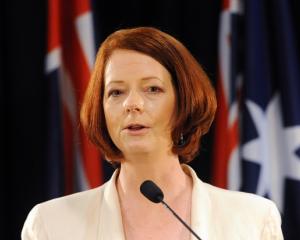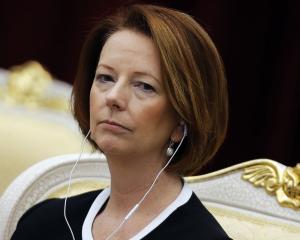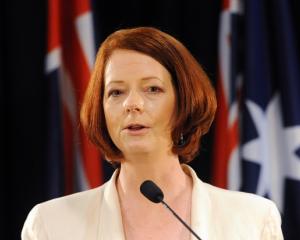Independent MPs Bob Katter (Kennedy, Queensland), Rob Oakeshott (Lyne, New South Wales), Andrew Wilkie (Denison, Tasmania) and Tony Windsor (New England, New South Wales) have Australia's two major political parties battling for their support.
Together with Greens MP Adam Bandt, who won the party's first Lower House seat at a general election, the five will probably determine who will form Australia's next government.
With the poll result still hanging in the balance after Saturday's Australian general election, it is clear neither Ms Gillard's Labor Party nor Mr Abbott's Liberal-National coalition party will have enough seats to govern in their own right.
It is the first hung parliament in Australia since World War 2.
Bob Katter (65) was a labourer and an investor in cattle and mining interests before entering politics.
Until 2001, he represented the National Party of Australia, but left the party that year and continued to hold the seat as an independent.
Rob Oakeshott (40) was an administrative officer at the Road Transport Forum before entering politics in 1995.
He is also a former National politician.
Andrew Wilkie (49) was a soldier and intelligence analyst with the Australian Office of National Assessments.
He resigned in 2003 over concerns intelligence was being misrepresented for political purposes in making the case for Australia's contribution to the 2003 invasion of Iraq.
Tony Windsor (59) was a farmer and an economist before entering politics, where he has been an independent member of the House of Representatives since 2001.
And Adam Bandt was a barrister before being elected to the Lower House of Parliament in the weekend election.
University of Otago constitutional and electoral law Associate Professor Andrew Geddis said New Zealand political parties had become used to wooing minor parties to form governments, but it was something with which Australian politicians had little experience.
Prof Geddis said the situation created by the Australian election might make governing the country uncertain for a time, because it would make it harder "to get things done".
He said it could be weeks before a government could be formed.
"The problem is there are postal ballots still outstanding. It could take a week just to get all results in.
"They will be very important, because there are very few votes separating some seats.
"The votes won't give any party a majority, but they will give one party more power to lure independents into supporting them in government."
The Australian election would have a short-term impact on financial markets, he said.
"The markets don't like uncertainty. How they will react we don't know yet."
In the longer term, the effects could be more substantial, Prof Geddis said.
"Australia has yet to introduce an emissions trading scheme.
My prediction is this election process will slow down Australia's introduction of an ETS.
That could make it more difficult to do business between New Zealand and Australia, because New Zealand's economy will be operating on a different incentive basis.
"New Zealand offers incentives to forestry, and disincentives to plastics and mining industries.
"It means that doing business in New Zealand will be a different environment to Australia. The aim has always been to harmonise the two economies."






